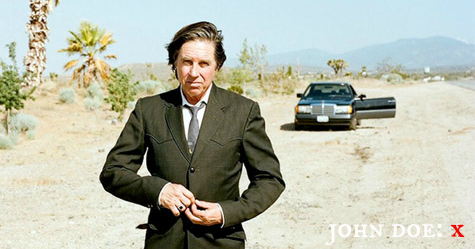I had the opportunity a few days ago to speak briefly with John Doe of the legendary Los Angeles punk band X. Doe, along with his bandmates Exene Cervenka, Billy Zoom, DJ Bonebrake, after making their way thorugh Chicago in early September, will be playing two dates in Michingan… September 6 at The Magic Bag in Ferndale, and September 8 at The Pyramid Scheme in Grand Rapids. And, on the 13th, Doe will be coming back to Michigan, on his own, to perform an acoustic set at the 8th annual Ypsi Song Fest. (Doe will be performing at 8:00 PM at the Bona Sera Underground. The event, thanks to the hard work of our friends at the Ypsilanti District Library, will be free and open to the public, as are all of the festival-related events to be held throughout the day.) While we didn’t have enough time to delve too deeply into his solo career, or the work he’s done over the past 20 years as an actor, we did have a chance to talk a quite a bit about his progression as a writer and the birth of the LA punk scene in the mid ‘70s. I hope you enjoy it.
But first… For those of you who may not be familiar with X, here’s the first song by them that I ever heard, the absolutely brilliant title track from their 1980 debut album Los Angeles
[note: The following has been somewhat edited in hopes of making it more readable.]
MARK: Before we get into X, and everything that’s come after it, I’d like to ask about your life prior to arriving in Los Angeles in ‘76. I know that you were born in Decatur, Illinois, in ‘54, and that you moved to Baltimore as a kid, and stayed there until you graduated from the Baltimore campus of Antioch College in 1975, but that’s about it… When did you first start writing songs?
JOHN: I wrote a bunch of shitty songs when I was, I don’t know, 13 or 14. And I kept doing that until I was 22. So, 8 years, or something like that. And I think I started writing good songs just before I got to California. But California is where I really simplified things… And I probably first wrote something that was really worthwhile when I was 23 or 24.
MARK: Do you remember why it was, at 13 or 14, that you decided to start writing songs?
JOHN: When I was like 10, or maybe even a little younger, the British Invasion began. And we all saw that and thought, “Huh, that looks cool. I’d like to do that.” (laughs)
MARK: Were you in Baltimore at the time?
JOHN: Yeah, I was living outside of Baltimore.
MARK: What took you to Baltimore?
JOHN: My parents. My dad was a librarian, and he got better and better jobs, and we ended up in Baltimore.
MARK: Given that you graduated from college in Baltimore in ‘75, you would have been in town when John Waters first started making films. I’m curious as to whether your paths ever crossed.
JOHN: Oh, yeah. We hung out several times. I used to play at a place called Bertha’s. Me and another guy would play for tips. And John would be there in the late afternoon and we’d sit and talk about Tennessee Williams and other writers that we liked.
MARK: Did you have an interest in film at that point… an interest in acting?
JOHN: Yeah, I loved film, but I didn’t think I’d have an opportunity to… I didn’t have the interest to pursue it at that point.
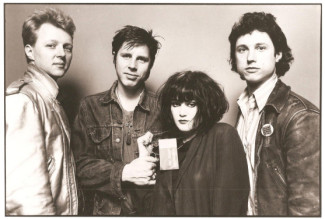 MARK: What did you think about John’s films at the time, and his whole scene in Baltimore?
MARK: What did you think about John’s films at the time, and his whole scene in Baltimore?
JOHN: I thought that his films were incredible. And he was the only true celebrity in Baltimore… He informed a lot of my sense of humor, and my ideas on pop culture, and punk rock.
MARK: I’ve heard you mention elsewhere that you’d gone to New York relatively early on in the punk era, and visited CBGBs and Max’s Kansas City. As I’m guessing that you liked what you saw, I’m wondering why it was, later in ‘76, you decided to move to LA instead of New York. Did you get the sense that the scene in New York would have already peaked by the time you got there and started trying to put a band together, whereas it hadn’t really started yet in LA?
JOHN: No, I was just sick of the east coast. There was much less freedom on the east coast. Mental state. Attitude. There still is. And I was inspired by the west coast writers. Nathaniel West
MARK: That was your first time in LA?
JOHN: Yeah, and then I moved out there in October.
MARK: Speaking of the punk scene in New York, what did you think of it?
JOHN: I thought it was great. It wasn’t over. It was just fully realized. I didn’t want to have to break into something that was already full-blown… But, really, the most important thing was that I couldn’t stand the summers, and the winters sucked as well. (laughs) Weather, and attitude, and just being burned out on, “Oh, you can’t do that. Don’t try to do that.” Fuck you.
MARK: In ‘75 or ‘76, when you went to New York, did you go expressly to see what was happening around Max’s and CBGBs, or did you just kind of stumble on the scene when you were there?
JOHN: My parents lived in Brooklyn at that point, so I had a free place to stay. And I knew that Patti Smith was giving readings at the St. Mark’s Poetry Project.
MARK: So it was primarily the poetry side of things that had caught your attention… Had you heard about the Ramones before you went out?
JOHN: No, not really.
MARK: What bands did you see on that visit?
JOHN: The Heartbreakers. The Talking Heads. And a couple of others that I don’t remember.
MARK: Did you know by that point that you wanted to make music for a living? Or were you contemplating being a writer? Had you made up your mind yet which way you wanted to go?
JOHN: No, I knew I wanted to do music since I was about 15.
MARK: I ask because it was sounding to me like your interest in poetry kind of rivaled your interest in music at that time.
JOHN: Sure. (laughs) But you can’t make a living as a poet. (raises voice) Are you kidding? (laughs)
MARK: So what did you do first upon arriving in LA? I know that you met Exene at a poetry workshop in Venice Beach. Was that relatively early on?
JOHN: Yeah, that was soon after (arriving in LA). I ran a poetry reading series in Baltimore with a few other poets. It was through the Baltimore branch of Antioch, where I went to college. And some of us ran this poetry reading series. We read the Beat poets. Some New York poets. Things like that. So I figured that was a good culture to tap into when I moved to LA. I knew that the Beats had started in Venice. And that’s where (I met) Exene.
MARK: Having read over some of your comments about the LA punk scene, in preparation for our interview today, I noticed that there are a few themes that seem to keep coming up. One is a dissatisfaction with the way that the scene has been portrayed in books and films. If you were able to rewrite some of the history that’s been written about the origins of punk rock in LA, what is it that you’d most like to change?
JOHN: I’d just want it to be more balanced. It’s all been very sensational. It’s traded on the sensationalism of the punk scene.
MARK: When did the sensationalism start? Was it there before the Penelope Spheeris documentary The Decline of Western Civilization came out in ‘80 or ‘81? Was there an article that you can remember when you thought, “OK, that’s how they’re going to portray us?”
JOHN: No, it wasn’t really happening before The Decline of Western Civilization. The people who wrote about punk rock first were people who got it. They were people in the underground press. And they understood that diversity and originality were the keystones of punk rock. I’d say the first time we realized it was when we saw the groups being included in The Decline of Western Civilization. There were so many more acceptable, and kind of rock and roll bands that were playing at the time (that didn’t get included in the movie). And that was the key to the LA scene. The LA scene understood Chuck Berry and Eddie Cochran, and things like that. Whereas the New York scene was much more involved with the Velvet Underground, and art galleries, and the minimalism that Andy Warhol was all about.
X IN THE DECLINE AND FALL OF WESTERN CIVILIZATION:
MARK: So you knew, when you got involved in The Decline of Western Civilization, based on the other LA bands that Spheeris was talking to, that she was going to take that angle? Or did you just figure it out once it was all done and you saw it on the screen?
JOHN: After it was all done. Yeah. We knew that they were choosing the more hardcore bands… although that wasn’t really a term back then. But we figured, “Oh, well. It’s exposure.”
MARK: I’ve heard rumors over the years that Spheeris and her crew provided drugs and alcohol to the bands prior to filming, thus ensuring they got the kinds of over-the-top shots they were looking for. Can you confirm that?
JOHN: That’s the story that I was told. Yes.
MARK: But not in your case?
JOHN: No. (laughs) We got our own. (laughs)
MARK: I’m curious as to the timing of everything and how it all came together. It seems like it happened really quickly. You got there at the end of ‘76. And The Masque opened in early ‘77…
JOHN: I think Brendan (Mullen) had already rented the space by the middle, or end, of ‘76.
MARK: So you were getting to town right as it was opening… Do you remember the sequence of events.
JOHN: I think it was pretty simultaneous.
MARK: It’s just really interesting to me, the parallel between New York, where you had CBGB and Punk magazine kind of blosuming at the same time, and LA, where you had The Masque and the zine Slash kind o doing the same thing. I guess you need that to have a successful scene. You need the right club with the right environment, and the right people promoting it, writing about it.
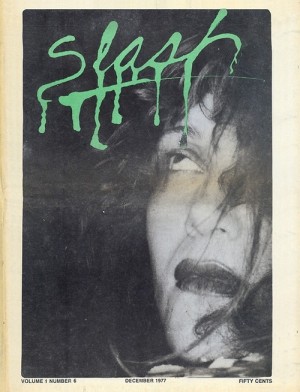 JOHN: It was time. It was in the air. It was in the water. It was time for that to happen. That’s why it happened almost simultaneously… like within a year or so… in New York, and then London, and then LA. The New York bands were coming to the Whisky, and other places. So was The Damned. And eventually Devo. It was just time.
JOHN: It was time. It was in the air. It was in the water. It was time for that to happen. That’s why it happened almost simultaneously… like within a year or so… in New York, and then London, and then LA. The New York bands were coming to the Whisky, and other places. So was The Damned. And eventually Devo. It was just time.
MARK: I’m curious as to how things evolved once the more sensationalistic narrative about punk got out there, portraying the movement as a relatively narrow one, built on a foundation of violence and nihilism… I’m assuming that a different group of people started coming out to shows once this violent vision of punk started making its way into the mainstream by way of shows like Quincy and CHiPs, right?
JOHN: Yeah, but that was already happening. In that way, The Decline of Western Civilization was just reflecting what was already starting. The more people that start arriving at a scene, the harder it is to have a unified message, and acceptance, and things like that… Like accepting all of the different people within the subculture.
MARK: As you’ve mentioned, at the beginning, the movement was a lot more broad and diverse. What bands tend to get left out of the story that should be remembered?
JOHN: The Weirdos. They were a rock and roll band. They dressed more like an art rock group, but they were really a rock and roll band. And I hear that they’re playing again, which is exciting.
MARK: So X is no longer “the last punk band standing,” as you’re known to refer to yourselves?
JOHN: (laughs) Well, I don’t know. They don’t have all of the original members, so we still have that title. As for other bands, I would have included The Go-Go’s. I would have included the The Plugz, who were there from the beginning. The Bags. The Alley Cats. Black Randy and the MetroSquad, which was a totally crazy outfit… Black Randy was a sociopath. (laughs) He was truly insane. But it was more irreverent and playful, and not confrontational. Black Randy’s music was kind of twisted R&B.
MARK: Have you ever thought about writing something of your own, to chronicle your experiences in the scene.
JOHN: Yeah, actually I’m working on that now.
MARK: How’s it going?
JOHN: Good. It’s actually not just going to be just me. It’ll be a collaborative book, where different people who are good writers, or can write, and have an interest in it, that they each have chapters. So it’s cooperative, or collaborative, like the punk rock scene was.
MARK: Will it be about the LA scene, or will it be more broad than that?
JOHN: No, just the LA scene… That’s the only one I really know about.
MARK: Would I be overstating the importance of The Masque if I said that there wouldn’t have been an LA scene without it? That, while there was a lot of activity in the way of house parties, people needed an epicenter… a place to coalesce around?
JOHN: I don’t think you can (overstate it). That was the place that knit most of it together. But, most people lived in Hollywood or West Hollywood. So we just saw each other. People were around.
MARK: Was there any animosity toward Brendan? I seem to recall a comment in the documentary, X: The Unheard Music, in which something was said like, “No one made any money back then, except for Brendan.” Maybe I’m reading too much into it, but it made me wonder if bands may have felt, to some extent, that he was making money on the scene when they weren’t.
JOHN: Hmmm… Maybe… You know, because high school is never too far away… But not really, no.
MARK: And Brendan was also involved with the book We Got the Neutron Bomb : The Untold Story of L.A. Punk
JOHN: Brendan definitely should have some some more fact checking.
X: THE UNHEARD MUSIC:
MARK: And, what are you up to these days? Didn’t you just, over four consecutive days, play your first four records back-to-back, in their entirety?
JOHN: Yeah, we’re on a tour now. It’s great, you know. We’re doing three cities… New York, Chicago, and Cleveland… where we’re doing the four record stand. And then several others, like Philly, Pittsburgh, DC, Atlanta, Hartford, Boston, and a couple of places around Detroit, where we’re just playing single shows. And then we’ve also been working on a quote-unquote acoustic version, which we did a tour of on the west coast, and I think that we’re going to pursue that (elsewhere).
MARK: It seems to me that doing the complete record shows back to back would be really daunting. Was it tiring? In retrospect, do you think it was overly ambitious?
JOHN: A little bit. But, you know, it’s like Bette Davis said, “Getting old, or being in show business, isn’t for sissies.” You’ve just got to take care of yourself and have a strong spirit.
MARK: And, are you still acting?
JOHN: Yeah, I worked on a couple of films in 2012. And I’ve had a bunch of requests recently, but I haven’t been able to do them. It’s always a juggling act… One of the films I did in 2012 is called Pleased to Meet Me. It’s available through video-on-demand. It had a limited theatrical run. We showed in in Louisville, where we shot it, and Cincinnati, and Chicago, and a few other cities in the south and midwest.
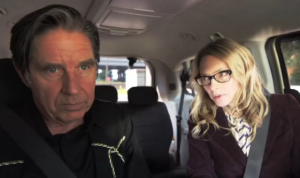 MARK: Amiee Man was in that too, right?
MARK: Amiee Man was in that too, right?
JOHN: Yeah, Amiee Mann, Loudon Wainwright, and Joe Henry. It was good.
MARK: What was your role in that?
JOHN: I basically played a different version of myself… It’s a good film. It’s very indie. We made it in about ten days for a dollar and a half.
MARK: It seems like you’ve found a nice balance between the worlds of music and film, kind of like Harry Dean Stanton.
JOHN: (laughs) In my dreams. I’d love to be half as good and Harry Dean.
MARK: There’s really no one better positioned than you to inherit his position in Hollywood when he retires, is there?
JOHN: (laughs) Well, I’ll take that as a high compliment.
MARK: Did you take acting classes, or just kind of pick it up naturally?
JOHN: I took a few classes. Actually, it was after I worked with Harry Dean in a movie. I realized that I was being left in the dust. So I thought that I should figure it out. I did some improv and some team study. But, for the most part, it’s been on the job training.
MARK: I didn’t realize when I mentioned Stanton that you’d actually worked with him. What was the film?
JOHN: It wasn’t a very good movie. It was ambitious, though. It was called Slam Dance
MARK: And what was it about his acting that made you realize that this was a real craft that you needed to work at?
JOHN: The power. He had this subtle power without really even doing anything.
MARK: Speaking of power, would you like to talk politics for a minute? I’m curious as to what you think about the state of the world today.
JOHN: I don’t know that it’s… Hmmm… I think people should look behind the veil. I think that a lot of stuff is being played and manipulated. I’m not a fan of our government. I think that a person scorned is a terrible thing. And I feel that a lot of people are either right wing and reactionary, or left wing and disappointed. But I think a lot of it is being spun, and a lot of it is being played… We’re in a really strange place. And I’ll give you an example of that. Exene and I went out to have lunch, and her bill was like $15. And she’d just been to a casino, so she had a $100 bill. And this was at a chain restaurant. And she tried to pay for it with this $100 bill, and this young man says, “Oh, corporate says we can’t take that, because there have been so many phonies.” And Exene says, “But it’s not a new one.” It was an old $100 bill. And he said, “Yeah, I know, but corporate says we can’t take it.” It’s just frightening that people can’t make up their own minds, can’t make a judgement call… “Corporate says that we can’t do this.” It’s just weird. I’m not a conspiracy theorist, but I think that is sad and strange… That’s fucked up. (laughs)
MARK: Everyone lucky enough to have a job, I guess, is just so fearful and anxious that they might lose it. More broadly, though, I agree with you that these are crazy times. There’s a lot of fear. With global warming, water shortages, a steadily shrinking middle class, tanks on our streets, and everything else… People know that we’re living through a period of enormous change, and it’s terrifying. And there’s a kind of madness in the air. And people are beginning to turn on one another. But maybe there’s some positive too. Maybe this is an opportunity for positive, sustainable change and stronger communities. Assuming, of course, that people can get their shit together before it’s too late.
JOHN: Yeah, I don’t know. I just think a lot of stuff is being manipulated. And I don’t think we have even a quarter of the story.
MARK: You certainly see that with billionaires, like the Koch brothers, pouring millions of dollars into creating fake grassroots campaigns, convincing people, for instance, that it’s in their best interest to fight against laws to address global warming, when it’s clearly not. There are definitely forces behind the scenes, pulling strings.
JOHN: Yeah, there’s that… But also I’m suspicious of the sudden emergence of ISIS. Suddenly it’s like, “Oh, there’s the boogeyman!” And we’re in for the next 100 year war because anybody who is somehow connected to al Qaeda or the Taliban are also our enemies. So we give the President the right… “Oh, they’re the enemy. Get them.”
MARK: And we send in the drones… So, on to happier matters, you’re going to be coming to Ypsilanti in a few weeks to perform an acoustic show as part of a local songwriting festival. And I expect, while you’re here, you’ll have an opportunity to talk a bit about writing with folks at the event, many of whom, I’m sure, will be young, aspiring writers…
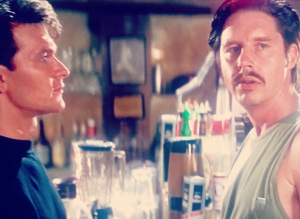 JOHN: I’m looking forward to it. I’ve taught writing workshops in the past, and it’s something that I think a lot about.
JOHN: I’m looking forward to it. I’ve taught writing workshops in the past, and it’s something that I think a lot about.
MARK: I think it’s especially important now, given the recent cuts to public education arts programs, to have these kind of events for young people, who desperately need that creative outlet…
JOHN: Art is where reality and truth intersect with our dreams. It’s that meetingplace.
MARK: What would your advice be to yourself, as that 13 year old aspiring writer?
JOHN: Just find things. Be fearless. And find things (to write about)… (laughs) I also have theory that, if you’re going to do it, you’re going to do it, so the advice really doesn’t matter. (laughs) I would say, “Don’t do it.” Because, if you’re going to, you will anyway.
John Doe will be performing at the 8th annual Ypsi Song Fest on the evening of September 13. The festival is presented by the Ypsilanti District Library, the Michigan Council for Arts and Cultural Affairs, and the National Endowment for the Arts.
If, by chance, you enjoyed this interview and want to read what some other famous musicians were thinking about at they contemplated their trips to Ypsilanti, check out our interviews with The Coup’s Boots Riley and Fugazi’s Ian MacKaye. Both are awesome.
Oh, and it you don’t recognize that last image, it’s of Doe being fired by Patrick Swayze in Roadhouse.
